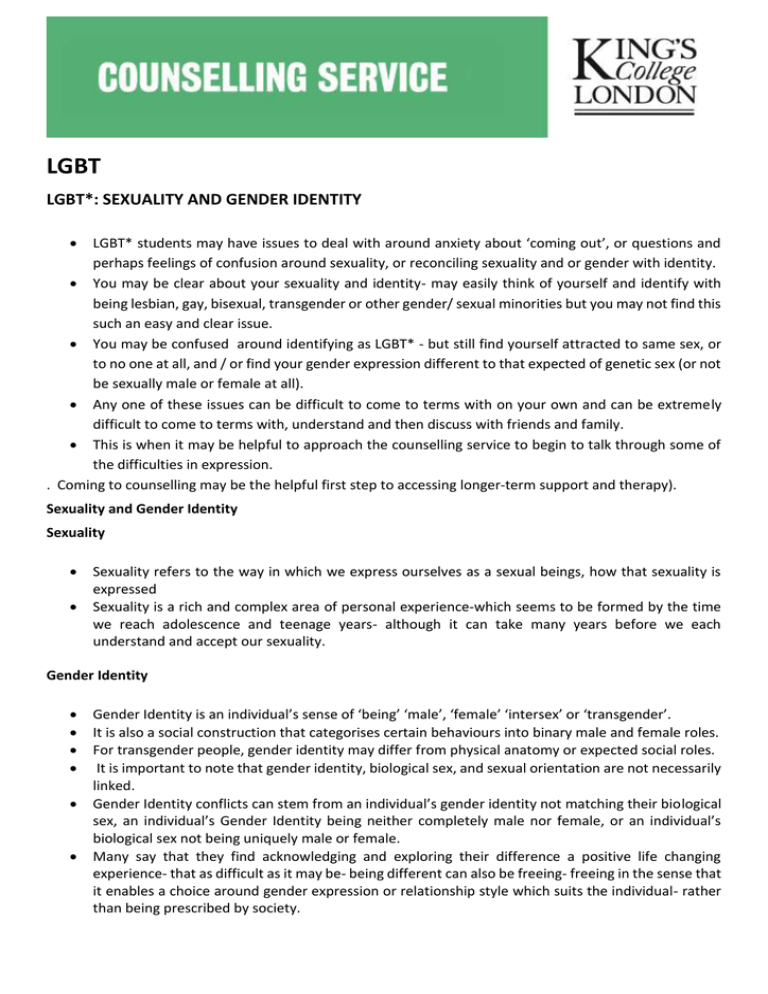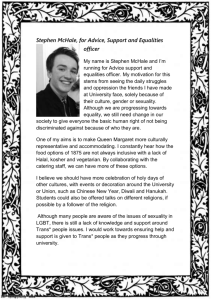
LGBT
LGBT*: SEXUALITY AND GENDER IDENTITY
LGBT* students may have issues to deal with around anxiety about ‘coming out’, or questions and
perhaps feelings of confusion around sexuality, or reconciling sexuality and or gender with identity.
You may be clear about your sexuality and identity- may easily think of yourself and identify with
being lesbian, gay, bisexual, transgender or other gender/ sexual minorities but you may not find this
such an easy and clear issue.
You may be confused around identifying as LGBT* - but still find yourself attracted to same sex, or
to no one at all, and / or find your gender expression different to that expected of genetic sex (or not
be sexually male or female at all).
Any one of these issues can be difficult to come to terms with on your own and can be extremely
difficult to come to terms with, understand and then discuss with friends and family.
This is when it may be helpful to approach the counselling service to begin to talk through some of
the difficulties in expression.
. Coming to counselling may be the helpful first step to accessing longer-term support and therapy).
Sexuality and Gender Identity
Sexuality
Sexuality refers to the way in which we express ourselves as a sexual beings, how that sexuality is
expressed
Sexuality is a rich and complex area of personal experience-which seems to be formed by the time
we reach adolescence and teenage years- although it can take many years before we each
understand and accept our sexuality.
Gender Identity
Gender Identity is an individual’s sense of ‘being’ ‘male’, ‘female’ ‘intersex’ or ‘transgender’.
It is also a social construction that categorises certain behaviours into binary male and female roles.
For transgender people, gender identity may differ from physical anatomy or expected social roles.
It is important to note that gender identity, biological sex, and sexual orientation are not necessarily
linked.
Gender Identity conflicts can stem from an individual’s gender identity not matching their biological
sex, an individual’s Gender Identity being neither completely male nor female, or an individual’s
biological sex not being uniquely male or female.
Many say that they find acknowledging and exploring their difference a positive life changing
experience- that as difficult as it may be- being different can also be freeing- freeing in the sense that
it enables a choice around gender expression or relationship style which suits the individual- rather
than being prescribed by society.
Student Service
Counselling support may be helpful but equally the LGBT+ community may be able to offer an
opportunity to meet and mix with a wide variety of individuals. The experience of coming to know
oneself and being out can be both challenging and inspiring.
The Counselling Service will be glad to offer support and counselling on any of the matters discussed
above, as will the Student's Union LGBT Association.
Further Support and information
Pink Therapy
http://www.pinktherapy.com/ The UK's largest independent therapy organisation working with gender
and sexual diversity clients.
Families & Friends of Lesbians and Gays (FFLAG)
http://www.fflag.org.uk/
A national voluntary organisation supporting the parents and families of LGB people.
BrokenRainbow
http://www.broken-rainbow.org.uk/
Offers support to LGBT victims and survivors of domestic violence and abuse.
PACE
http://www.pacehealth.org.uk/
Promoting the mental health and emotional well-being of the lesbian, gay, bisexual and transgender
community.
London Friend
http://www.londonfriend.org.uk/
A charity that promotes the social, emotional, physical and sexual health and well-being of lesbian, gay and
bisexual people, including transgender people who identify as lesbian, gay or bisexual and all those unsure
of their sexuality.
The Beaumont Society
http://www.beaumontsociety.org.uk/Index.html
The largest and longest established transgendered support group in the UK.
The Gender Trust
http://gendertrust.org.uk/
Supporting all those affected by gender identity issues Adviser for further advice.
kcl.ac.uk/advice


